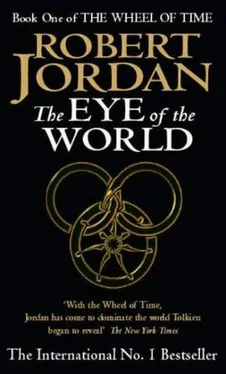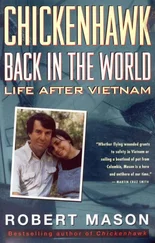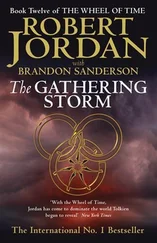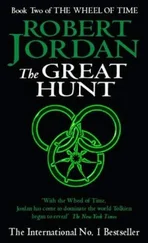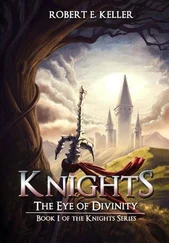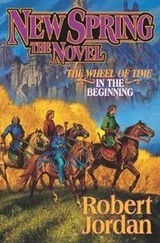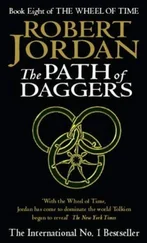Robert Jordan - The Eye of the World
Здесь есть возможность читать онлайн «Robert Jordan - The Eye of the World» весь текст электронной книги совершенно бесплатно (целиком полную версию без сокращений). В некоторых случаях можно слушать аудио, скачать через торрент в формате fb2 и присутствует краткое содержание. Год выпуска: 1990, Жанр: Фэнтези, на английском языке. Описание произведения, (предисловие) а так же отзывы посетителей доступны на портале библиотеки ЛибКат.
- Название:The Eye of the World
- Автор:
- Жанр:
- Год:1990
- ISBN:нет данных
- Рейтинг книги:2.5 / 5. Голосов: 2
-
Избранное:Добавить в избранное
- Отзывы:
-
Ваша оценка:
- 60
- 1
- 2
- 3
- 4
- 5
The Eye of the World: краткое содержание, описание и аннотация
Предлагаем к чтению аннотацию, описание, краткое содержание или предисловие (зависит от того, что написал сам автор книги «The Eye of the World»). Если вы не нашли необходимую информацию о книге — напишите в комментариях, мы постараемся отыскать её.
The Eye of the World — читать онлайн бесплатно полную книгу (весь текст) целиком
Ниже представлен текст книги, разбитый по страницам. Система сохранения места последней прочитанной страницы, позволяет с удобством читать онлайн бесплатно книгу «The Eye of the World», без необходимости каждый раз заново искать на чём Вы остановились. Поставьте закладку, и сможете в любой момент перейти на страницу, на которой закончили чтение.
Интервал:
Закладка:
Robert Jordan
The Eye of the World

Earlier
Ravens
This far below Emond’s Field, halfway to the Waterwood, trees lined the banks of the Winespring Water. Mostly willows, their leafy branches made a shady canopy over the water near the bank-Summer was not far off, and the sun was climbing toward midday, yet here in the shadows a soft breeze made Egwene’s sweat feel cool on her skin. Tying the skirts of her brown wool dress up above her knees, she waded a- little way into the river to fill her wooden bucket. The boys just waded in, not caring whether their snug breeches got wet. Some of the girls and boys filling buckets laughed and used their wooden dippers to fling water at one another, but Egwene settled for enjoying the stir of the current on her bare legs, and her toes wriggling on the sandy bottom as she climbed back out. She was not here to play. At nine, she was carrying water for the first time, but she was going to be the best water-carrier ever.
Pausing on the bank, she set down her bucket to unfasten her skirts and let them fall to her ankles. And to retie the dark green kerchief that gathered her hair at the nape of her neck. She wished she could cut it at her shoulders, or even shorter, like the boys. She would not need to have long hair for years yet, after all. Why did you have to keep doing something just because it had always, been done that way? But she knew her mother, and she knew her hair was going to stay long.
Close to a hundred paces further down the river, men stood knee-deep in the water, washing the black-faced sheep that would later be sheared. They took great care getting the bleating animals into the river and back out safely. The Winespring Water did not flow as swiftly here as it did in Emond’s Field, yet it was not slow. A sheep that got swept away might drown before it could struggle ashore.
A large raven flew across the river to perch high in the branches of a whitewood near where the men were washing sheep. Almost immediately a redcrest began diving at the raven, a flash of scarlet that chattered noisily. The redcrest must have a nest nearby. Instead of taking flight and maybe attacking the smaller bird, though, the raven just shuffled sideways on the limb to where a few smaller branches sheltered it a little. It peered down toward the working men.
Ravens sometimes bothered the sheep, but ignoring the redcrest’s attempts to frighten it away was more than unusual. More than that, she had the strange feeling that the black bird was watching the men, not the sheep. Which was silly, except … She had heard people say that ravens and crows were the Dark One’s eyes. That thought made goosebumps break out all down her arms and even on her back. It was a silly idea. What would the Dark One want to see in the Two Rivers? Nothing ever happened in the Two Rivers.
“What are you up to, Egwene?” Kenley Ahan demanded, stopping beside her. “You can’t play with the children today.” Two years older than she, he carried himself very straight, stretching to seem taller than he was. This was his last year carrying water at the shearing, and he behaved as if that cloaked him with some sort of authority.
She gave him a level look, but it did not work as well as she hoped.
His square face twisted up in a frown. “If you’re turning sick, go see the Wisdom. If not … well … get on about your work.” With a quick nod, as if he, had solved a problem, he hurried off making a great show of holding his bucket with one hand, well away from his side. He won’t keep that up long once he’s out of my sight, she thought sourly. She was going to have to work on that look. She had seen it work for older girls.
The dipper’s handle slid on the rim of her bucket as she picked it up with both hands. It was heavy, and she was not big for her age, but she followed Kenley as quickly as she could. Not because of anything he had said, certainly. She did have work to do, and she was going to be the best water-carrier ever. Her face set with determination. The mulch of last year’s leaves rustled under her feet as she walked through the river’s shadowy fringe of trees, out into the sunlight. The heat was not too bad, but a few small white clouds high in the sky seemed to emphasize the brightness of the morning.
Widow Aynal’s Meadow-it had been called that as long as anyone could remember, though no one knew which Aynal widow it had been named after-the tree-ringed meadow stood empty most of the year, but now people and sheep crowded the whole long length of it, a good many more sheep than people. Large stones stuck out of the ground here and there, a few almost as tall as a man, but they did not interfere with the activity in the meadow. Farmers came from all around Emond’s Field for this, and village folk came out to help relatives. Everyone in the village had kith or kin of some sort on the farms. Shearing would be going on all across the Two Rivers, down at Deven Ride and up to Watch Hill. Not at Taren Ferry, of course. Many of the women wore shawls draped loosely over their arms and flowers in their hair, for the formality and so did some of the older girls, though their hair was not in the long braid the women had. A few even wore dresses with embroidery around the neck, as if this really were a feastday. In contrast, most of the men and boys went coatless, and some even had their shirts unlaced. Egwene did not understand why they were allowed to do that. The women’s work was no cooler than the men’s.
Big, wooden-railed pens at the far end of the meadow held sheep already sheared, and others held those waiting to be washed, all watched by boys of twelve and up. The sheepdogs sprawled around the pens were no good for this work. Groups of those older boys were using wooden staffs to herd sheep to the river for washing, then to keep them from lying down and getting dirty again until they were dry for the men at this end of the meadow who were doing the shearing. Once the sheep were shorn, the boys herded them back to the pens while men carried the fleece to the slatted tables where women sorted the wool and folded it for baling. They kept a tally, and had to be careful that no one’s wool was mixed with anyone else’s. Along the trees to Egwene’s left, other women were beginning to set out food for the midday meal on long trestle tables. If she was good enough at carrying water, maybe they would let her help with the food or the wool next year, instead of two years later. If she did the best job ever, no one would ever be able to call her a baby again.
She began making her way through the crowd, sometimes carrying the bucket in both hands, sometimes shifting it from one to the other, pausing whenever someone motioned for a dipper of water. Soon she began to perspire again, sweating dark patches on her woolen dress. Maybe the boys with their shirts unlaced were not just being foolish. She ignored the younger children, running around rolling hoops and tossing balls and playing keepaway.
There were only five times each year when so many gathered: at Bel Tine, which was past; at shearing;when the merchants came to buy the wool, still a month or more off-, when the merchants came for the cured tabac, after Sunday; and at Foolday, in the fall. There were other feastdays, of course, but none where everyone got together. Her eyes kept moving, searching the crowd. Among these people, it would be all too easy to walk up on one of her four sisters. She always avoided them as much as possible. Berowyn, the eldest, was worst. She had been widowed by the breakbone fever last fall and moved back home in the spring. It was hard not to feel for Berowyn, but she fussed so, wanting to dress Egwene and brush her hair. Sometimes she wept and told Egwene how lucky, she felt that the fever had not taken her baby sister, too. Feeling for Berowyn would have been easier if Egwene could stop thinking that sometimes Berowyn saw her as the infant she had lost along with her husband. Maybe all the time. She was just watching for Berowyn. Or one of the other three. That was all.
Читать дальшеИнтервал:
Закладка:
Похожие книги на «The Eye of the World»
Представляем Вашему вниманию похожие книги на «The Eye of the World» списком для выбора. Мы отобрали схожую по названию и смыслу литературу в надежде предоставить читателям больше вариантов отыскать новые, интересные, ещё непрочитанные произведения.
Обсуждение, отзывы о книге «The Eye of the World» и просто собственные мнения читателей. Оставьте ваши комментарии, напишите, что Вы думаете о произведении, его смысле или главных героях. Укажите что конкретно понравилось, а что нет, и почему Вы так считаете.
